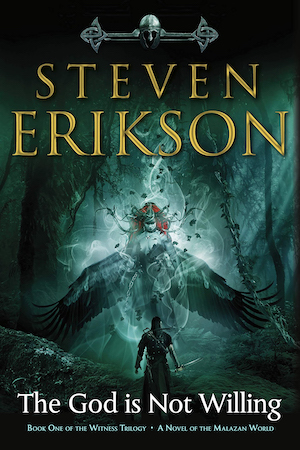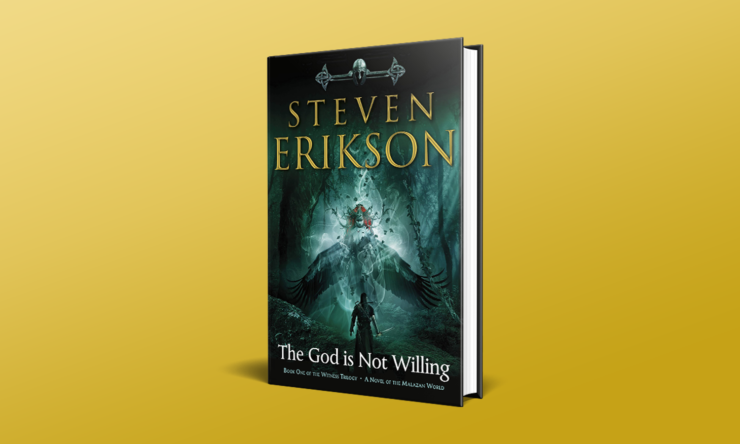Well, here we are all too soon at the end of our look at the opening of The God is Not Willing, after diving into the Prologue and Chapter One. We ended Chapter One with the unsettling idea that things are often not what they seem, and we pick up with Chapter Two (after the epigraph, of course) with a question from Spindle that has him worrying about that same concept.
This epigraph certainly fits the idea of Karsa just hanging out outside Darujhistan.
***
Notice that this question never actually gets answered:
“What were you doing with a company of four hundred veteran mercenaries, wandering through Fool’s Forest? The empire doesn’t hire mercenaries. It couldn’t have been to take Rinagg’s coin. Not at first.”
The answer might just be important.
***
‘The days of the ones worth anything are long gone, Balk’
There’s a recurrence of this idea throughout the novel—the old days are gone, the days of the Bridgeburners, the Bonehunters, the greater days of the Malazans, even the greater days of those the Malazans fought against. Is this reality? Or is this the usual “Golden Age” illusion? It’s tied in with all we’ve seen prior, and there certainly is an elegiac tone to much of the beginning of this novel.
***
‘Oh, Balk,’ Spindle said, resting the back of his head against the wall.
I like how when Spindle finally brings up that he was in one of those legendary companies and fought against those legends, it doesn’t come via boasting, but (at least this is how I hear this in my head), a quiet “those days are past so I don’t think about them” sort of tone. Which makes him all the more believable, no matter what Balk thinks. The same for his clear-sightedness, as when he notes that the Malazans were the “trespassers” when they fought the Mott Irregulars.
Given how we’re primed to like Spindle here, and to note his honesty and insight, we should probably pay attention when he tells us he doesn’t trust Balk. Just saying.
***
Speaking of legends, I love the game is now known as “Fiddler’s Gambit.” And of course “[t]here is no official version!” And then we get a few more of what we might call the “New Old Guard” as the chips are played. Some more obvious than others (black feathers, Icaria, the Eel). Anyone want to play match up? Finally, note that “flood of disaster” called out in the game—a charged choice of words given what we know is coming.
***
Note too that Anyx is an inventor and has invented some sort of weapon called the Iron Maw, both important points to file away. This is also another example of how technology doesn’t stagnate, in the Malazan universe, due to the existence of magic. We’ve seen multiple examples throughout the novels of innovations and improved iterations of existing tech, something I’ve always appreciated in this series.
***
Poor Stillwater, she never gets the jokes. Even when she makes them. And I love her reaction to learning someone else (really, a whole lot of someone elses) has come up with the “original” idea of combining an assassin and a mage (has she never played an RPG?).
***
There’s our first reference to munitions not being reliable. If you recall, by the time of The Crippled God, Hedge was using alchemical substitutes because there were so few munitions.
***
Is Oams a Claw? We know his mission was an assassination. As for the “jumpy thing”, apparently his encounter has left something (someone?) behind? Remember his last feeling was of it being “within.”
***
Probably not so good that a guy named “So Bleak,” who has been moved around from one slaughtered company to another, has a “bad feeling” about the near future. Especially given that he had the same feeling before his current company was sorely wounded just recently. And besides his company’s fate, we can add his death wish to our list of things to be worried about.
***
I reveled, all the way through this book, in how the heavies and some of the grunts are portrayed, with their language and debate skills, their memorization of poetry, etc. As for the topic of discussion, Stonewielder predicted this debate back in the eponymous novel by Esslemont: “So which would it be? Greymane wondered. The greatest mass-murderer of the region? Or a semi-mythical deliverer? Both, I imagine.” One thing I’ve learned in reading and rereading this series is that there are always echoes. Always.
***
And here’s Drillbent continuing the “things ain’t what they used to be” theme…
***
Did I mention that Stillwater is my favorite character in this book? Even when she isn’t thinking/talking, but is being talked about, she still cracks me up. Her “I’m not a mage” (and the reader knowing everyone knows she’s a mage) is another great running gag I never tired of. Poor Stillwater.
***
And all too soon we’ve come to the end of our preview. Even in this brief time though, there’s a definite sense of trouble/tension on the horizon:
Buy the Book


The God Is Not Willing
- The impending flood.
- The looming invasion ahead of the flood, by the Teblor but also by whatever allies Elade has found (remember his “we’re not alone” line).
- The Malazans heading to Silver Lake, which of course is where the invasion will come—so we’re set up for a possible direct conflict.
- If there is a major conflict, will the problems with the munitions be an issue?
- The Malazans are “joined” by the same mercenary squad that just killed a bunch of them. Will there be problems between the two groups? If there is an invasion, can the mercenaries be trusted?
- The never-answered question of what the mercenaries were doing in this area in the first place.
- Possible personal animus between Balk and Spindle, given Spindle holding a knife to his throat.
- So Bleak’s bad feeling, which has proven prescient before.
- So Bleak’s death wish.
- Oams’ spirit encounter, and something “jumpy” inside him.
- The question as to whether Oams is a Claw or not.
That’s a lot to be concerned about, given we’re only a few chapters in. But that’s what a good introduction should do: Set the stakes, give us some looming danger, then leave us eager to see how our protagonists avoid (or not) death and disaster. Though we won’t be here to discuss it, Chapter Three will swing us over to Silver Lake for another plot thread and an introduction (or reintroduction) of some of the other major characters in the book. As for me, there will be a break next week, but I’ll be back on TGISNW‘s release date, Tuesday, November 9th, for the final post—a review of the book as a whole!
(Please note: Because The God Is Not Willing was published in the U.K. in July, some potential spoilers may appear in the comments below, so please proceed at your own risk.)
Bill Capossere writes short stories, essays and plays; regularly reviews for Fantasy Literature; and pens the occasional post (or seven-year reread) for Tor.com. He lives in Rochester, NY, where in addition to writing and reading, he bikes to work as an adjunct English instructor, plays ultimate Frisbee and disc golf, and looks forward to the six-week hiking/camping trip he takes every summer. He can also be found on Twitter.










